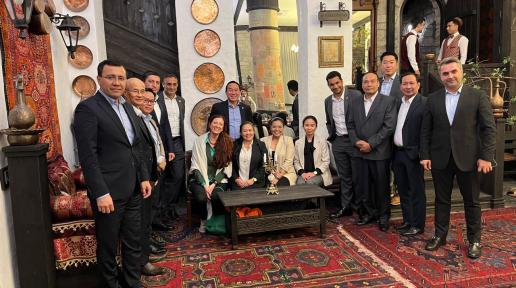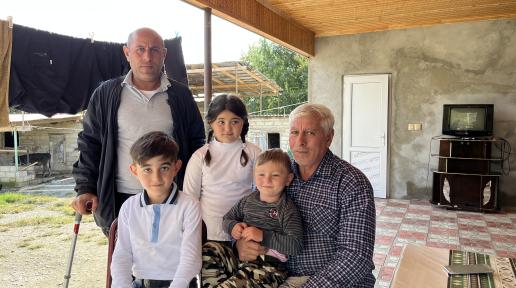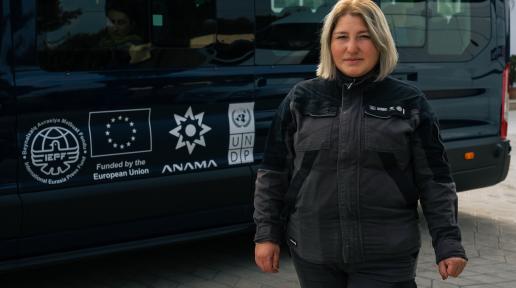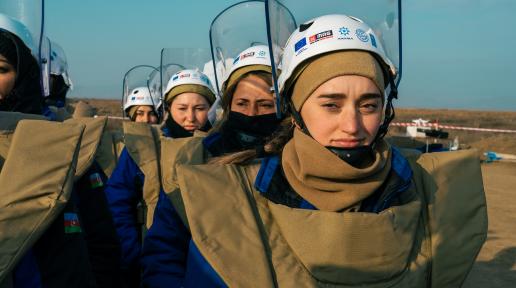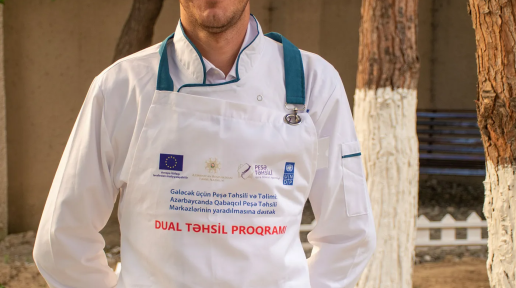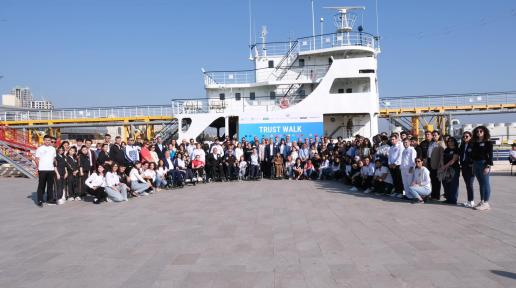Story
28 November 2024
COP29 and UN Azerbaijan: a Joint Commitment to Climate Action
In November 2024, Azerbaijan hosted COP29, convening global leaders and negotiators to advance climate action.
Beyond formal negotiations, COP29 featured side events and dialogues, fostering collaboration and strengthening partnerships for inclusive and sustainable
solutions.
• Following the COP29 presidency’s request for coordinated UN support, the Global UN COP29 Task Force was activated by the Deputy Secretary-General
and co-chaired by the Special Adviser to the Secretary-General on Climate Action and Just Transition and the UN Resident Coordinator in Azerbaijan. Consisting of around 25 UN entities, the Task Force provided substantive support for 12 (out of 14) Presidency Initiatives launched during COP29. The Task Force has been hailed as a good practice of inter-agency collaboration in support of host governments of large-scale international conferences.
• As an integral part of the UN Azerbaijan COP29 Engagement Strategy, the UN organized the climate conversations series 29 Climate Conversations on
the Road to COP29 in Baku and some regions, in partnership with the COP29 presidency, the government, the private sector, civil society, young people, development partners, academia, the media and others, to raise awareness of climate change and mobilize climate action across the country. Addressing topics such as digital innovation, just transition, reproductive health, and green finance, the series brought together government representatives, international organizations, civil society, and private sector leaders to drive actionable solutions.
• Designed to inspire meaningful discussions and solutions, the UN Azerbaijan Pavilion at COP29 hosted around 25 events to explore the effects of climate change on women, children, refugees, migrants, and other vulnerable groups. Distinguished speakers engaged with participants, particularly youth, in insightful discussions on climate leadership.
• A key feature of the pavilion was the Four Climate Dialogues, a series of high-level interviews with experts and leaders on critical climate issues. These discussions provided insights into sustainable development strategies and actionable resilience measures for Azerbaijan and beyond. In addition, the Climate Impact and World Children’s Day photo exhibitions were held.
• At COP29, Azerbaijan launched several key initiatives with UN support to advance climate action and sustainable development, including the Baku
The Harmony Climate Initiative for Farmers aims to strengthen climate change adaptation in agriculture, food systems, and water management. Multisectoral
Action Pathways (MAP) to Resilient and Healthy Cities, endorsed by 45 governments, provides a framework for integrating climate resilience, public
health, and urban sustainability into national policies. The launch of the National Strategy for 2025–2030 on the Prevention and Control of Zoonotic Diseases reaffirmed Azerbaijan’s commitment to global health security and climate resilience. In parallel, the Environmental Performance Review was presented, engaging
stakeholders in aligning environmental and economic goals, and assessing compliance with international environmental commitments.
• Azerbaijan has also signed the Declaration on Children, Youth and Climate Action, committing to put children at the centre of climate policy. The Government also joined the Global Children’s Environmental Health Collaborative, making the country the ninth globally to join the initiative, established to prioritize children’s environmental health needs in local and international platforms.
Beyond formal negotiations, COP29 featured side events and dialogues, fostering collaboration and strengthening partnerships for inclusive and sustainable
solutions.
• Following the COP29 presidency’s request for coordinated UN support, the Global UN COP29 Task Force was activated by the Deputy Secretary-General
and co-chaired by the Special Adviser to the Secretary-General on Climate Action and Just Transition and the UN Resident Coordinator in Azerbaijan. Consisting of around 25 UN entities, the Task Force provided substantive support for 12 (out of 14) Presidency Initiatives launched during COP29. The Task Force has been hailed as a good practice of inter-agency collaboration in support of host governments of large-scale international conferences.
• As an integral part of the UN Azerbaijan COP29 Engagement Strategy, the UN organized the climate conversations series 29 Climate Conversations on
the Road to COP29 in Baku and some regions, in partnership with the COP29 presidency, the government, the private sector, civil society, young people, development partners, academia, the media and others, to raise awareness of climate change and mobilize climate action across the country. Addressing topics such as digital innovation, just transition, reproductive health, and green finance, the series brought together government representatives, international organizations, civil society, and private sector leaders to drive actionable solutions.
• Designed to inspire meaningful discussions and solutions, the UN Azerbaijan Pavilion at COP29 hosted around 25 events to explore the effects of climate change on women, children, refugees, migrants, and other vulnerable groups. Distinguished speakers engaged with participants, particularly youth, in insightful discussions on climate leadership.
• A key feature of the pavilion was the Four Climate Dialogues, a series of high-level interviews with experts and leaders on critical climate issues. These discussions provided insights into sustainable development strategies and actionable resilience measures for Azerbaijan and beyond. In addition, the Climate Impact and World Children’s Day photo exhibitions were held.
• At COP29, Azerbaijan launched several key initiatives with UN support to advance climate action and sustainable development, including the Baku
The Harmony Climate Initiative for Farmers aims to strengthen climate change adaptation in agriculture, food systems, and water management. Multisectoral
Action Pathways (MAP) to Resilient and Healthy Cities, endorsed by 45 governments, provides a framework for integrating climate resilience, public
health, and urban sustainability into national policies. The launch of the National Strategy for 2025–2030 on the Prevention and Control of Zoonotic Diseases reaffirmed Azerbaijan’s commitment to global health security and climate resilience. In parallel, the Environmental Performance Review was presented, engaging
stakeholders in aligning environmental and economic goals, and assessing compliance with international environmental commitments.
• Azerbaijan has also signed the Declaration on Children, Youth and Climate Action, committing to put children at the centre of climate policy. The Government also joined the Global Children’s Environmental Health Collaborative, making the country the ninth globally to join the initiative, established to prioritize children’s environmental health needs in local and international platforms.




